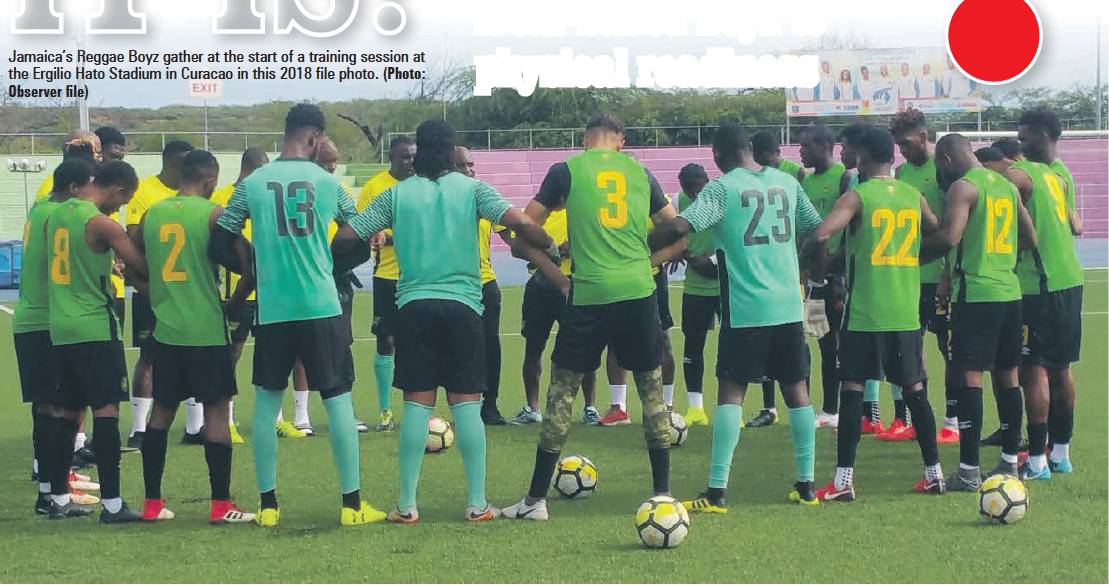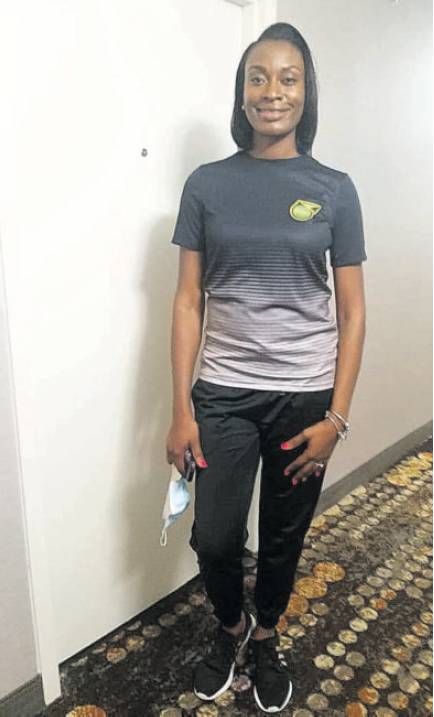IT IS WHAT IT IS!
Doc concedes big task ahead in bringing local-based Boyz to physical readiness
BY IAN BURNETT
Sport editor
WASHINGTON, DC, USA — Faced with less than ideal circumstances ahead of the Reggae Boyz’s March 25 fixture against the US in Austria, team doctor Ruchelle Brown Calvert has adopted a philosophical approach to her task of getting the players up and ready for battle.
Brown Calvert, who has almost three years of practice in sports medicine, has been asked to manage about nine locally-based players who have not played in a competitive football game in over a year.
But the sports medicine physician and lecturer in the Faculty of Sport at The University of the West Indies, Mona, is undaunted.
“It is what it is,” she told the Jamaica Observer last evening as the team remained holed-up in Washington, DC, awaiting Schengen visas for entry to Austria. “We just have to press on and emphasise the things that we have control over.”
However, Brown Calvert was quick to point out that the initial plan was to have the athletes in camp at the UWI-JFF Captain Horace Burrell Centre of Excellence for at least five days before travelling over the weekend and getting into the game next Thursday.
But the federation was forced to scrap the training camp for a rush to Washington, DC, to make in-person visa applications on Wednesday morning, leaving the players based in Jamaica with little or no time to get in much-needed training sessions.
Although adopting a philosophical tone, Brown Calvert has some concerns.
“Given this scenario of our athletes not participating in any competitive matches for the past year, there are two particular concerns that I would have,” she conceded. “One — that has to deal with the mental health or the psychological well-being of these athletes. Certainly, not playing any competitive sport [for such a long time] may affect their confidence.
“It may create some form of anxiety in the players, going out having not played in a while and wondering if they are up to par. Am I up to the task? Can I do this? So, there is that level of anxiety and stress that would be placed on the athlete.”
She added: “From a physical or sports science standpoint you would be concerned about things such as deconditioning — the level of aerobic fitness, and the level of strength capabilities.”
She said, thankfully, these players would have been still exercising at least on an individual level.
Brown Calvert also stressed that in terms of getting the players back to a particular level of fitness it would require much more time.
“For instance, to see the strength gains or the gains in aerobic fitness would need at least six weeks for them to be active in training.
“I am saying that to say time is needed. However, we are not functioning at a deficit where the players are deconditioned for a lack of playing. It’s not a case where they have not played any at all so they are deconditioned, but those would be areas of concern that would need to be addressed, but time would be the determinant of how much improvement that you would see in these athletes,” she explained.
Brown Calvert said from a more specific standpoint in relation to sports science she would focus mainly on pre-game and recovery strategies.
The pregame strategy would speak specifically to proper hydration during practice and gym sessions. The players need to be adequately hydrated to ensure that they are refuelling their bodies and replenishing the stores.
“Also of importance is their nutrition, which plays a significant part because it provides the carbohydrates that you need for fuelling the cells.
“Additionally, proper sleep hygiene is important. We have quite a bit of travelling to do, so we want to focus on the players getting adequate sleep and rest, because that will eventually reduce the risk of injuries and improve their performance. Fatigue impacts our reaction time, so I would want to stress that particular strategy in these athletes,” Brown Calvert noted.
Also, apart from sleep, nutrition, and hydration, she adds that they need to talk about appropriate warm-up and cooldown factors that reduce injury risks in athletes.
But at a time when support staff such as trainer and a physiotherapist are likely to be in high demand for the first time in a long time, neither is currently with the team.
Again, Brown Calvert was not overly perturbed.
“So we don’t have a physical trainer or a physiotherapist, but we do have a massage therapist, and we do have the coaches, and the information would have been passed from the physical trainer to the athletes,” she noted.
“They would have had a structured programme before so that should be used as a guide to help them (in this situation) before training sessions — proper stretching, a proper warm. So we will be working from prior knowledge and that is what we have to depend on so I’m not necessarily concerned about the absence of the two,” Brown Calvert concluded.

